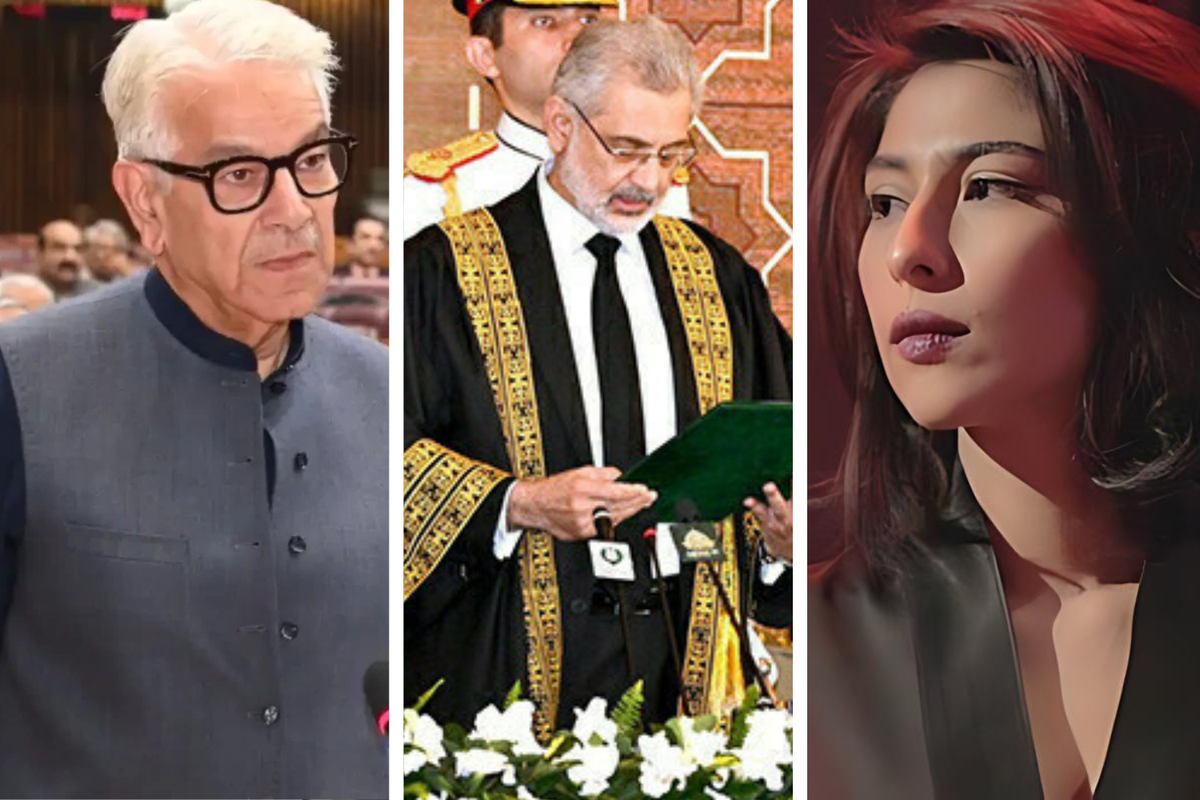Pakistan's new constitutional bench set to hear high-profile cases from Thursday
34 cases scheduled, including Isa appointment dispute and Meesha Shafi v Office of the Governor Punjab

Aamir Abbasi
Editor, Islamabad
Aamir; a journalist with 15 years of experience, working in Newspaper, TV and Digital Media. Worked in Field, covered Big Legal Constitutional and Political Events in Pakistan since 2009 with Pakistan’s Top Media Organizations. Graduate of Quaid I Azam University Islamabad.

Defense Minister Khawaja Asif (L), former Chief Justice Qazi Faez Isa (C) and musician Meesha Shafi (R).
Justice Aminuddin Khan to lead bench, Justice Ayesha Malik absent
Ali Zafar-Meesha Shafi harassment case among hearings
Cases range from election petitions to foreign marriage bans
After the passage of Pakistan's 26th constitutional amendment, the newly established constitutional bench of the Supreme Court will begin hearing cases on Thursday.
The Supreme Court's Public Relations Office announced on Wednesday that 18 cases are scheduled for November 14, with Justice Aminuddin Khan leading the constitutional bench. Justice Ayesha Malik will be absent from the proceedings.
The bench is scheduled to hear 16 additional cases on Friday, November 15.
One of the cases being examined is a dispute over Qazi Faez Isa's appointment as Chief Justice of the Balochistan High Court in 2009. Isa, who has been a central figure in Pakistani jurisprudence, faces scrutiny over his direct appointment as the Chief Justice of the provincial high court.
The constitutional bench will also hear the closely watched harassment case between musicians Ali Zafar and Meesha Shafi. Since Shafi first made allegations against Zafar in 2018, the case has become a flashpoint in Pakistan's nascent #MeToo movement and sparked widespread debate about workplace harassment in the entertainment industry.
Also scheduled for hearing is a petition from Pakistan Muslim League-Nawaz (PML-N) leader Khawaja Asif concerning the delayed Nandipur and Chichunki Malian power projects. The case highlights allegations of bureaucratic inefficiency, with project costs reportedly tripling from an initial estimate of $329 million. The power plants were designed to add 1,020 megawatts to Pakistan's national grid.
Wide variety of cases set
Apart from these high-profile cases, the constitutional bench's inaugural session will tackle a diverse range of issues. Environmental pollution cases are on the docket, alongside a quite-outdated petition seeking to reschedule the 2024 general elections.
The bench will also hear cases concerning the disqualification of assembly members holding foreign assets and businesses, and a petition to ban government officials from marrying foreigners.
Several financial matters are set for review, including a suo moto notice on Pakistanis' foreign bank accounts and a petition for recovering national wealth from abroad. The bench will also consider the private use of Islamabad's Convention Center.
Other significant cases include challenges to legislation passed during the Pakistan Democratic Movement (PDM) government's tenure and matters concerning the jurisdiction of Gilgit-Baltistan courts within Pakistan's legal framework.
26th amendment implemented
The hearings will come following the passage of the 26th Constitutional Amendment in October. The reform, pushed through in a late-night parliamentary session, established a new constitutional bench that some critics argue has created confusion in the judicial system.
The announcement ends weeks of uncertainty during which cases piled up without hearings. Justice Mansoor Ali Shah highlighted this limbo on Monday, reportedly questioning the legitimacy of the new structure by asking, "There is no constitutional bench at present, so what should be done with this unconstitutional bench?"
Legal observers note that the success of these initial hearings could determine the viability of Pakistan's reformed judicial system.










Comments
See what people are discussing